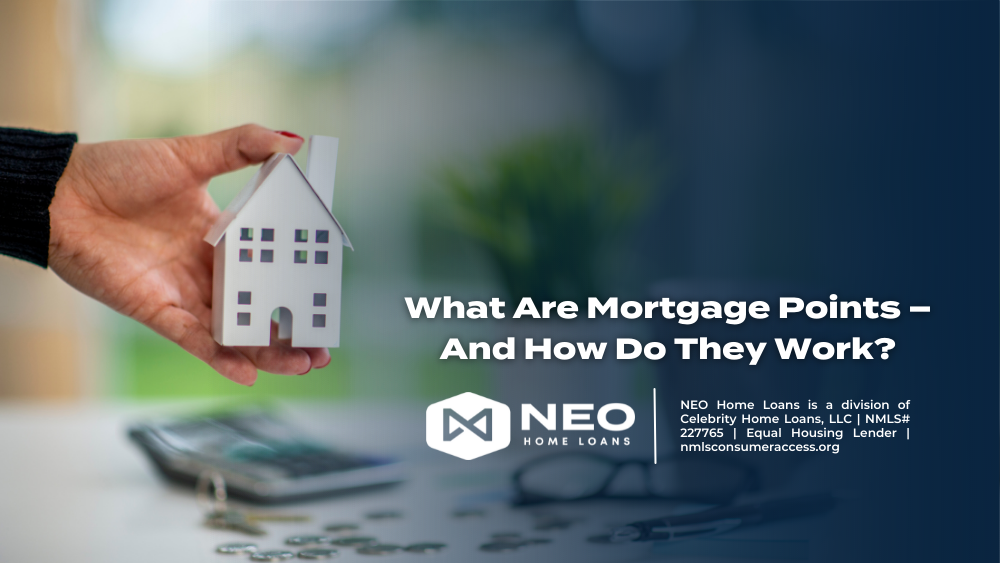
When mortgage rates rise, borrowers scramble to find ways to get the lowest possible interest rate. One option is to pay mortgage points to “buy down” your rate.
Saving money in the long run is a major reason home buyers decide to add points to their loans. Mortgage points allow borrowers to essentially buy a lower interest rate on their mortgage by paying an upfront fee. If you anticipate staying in your home for several years and don’t plan to refinance for a while, purchasing points could be an excellent cost-saving option.
However, mortgage points may not be the best option for every buyer. It’s important to do some research and find out the best solution for you before starting the mortgage process.
This article breaks down everything you need to know about mortgage points so you can decide if purchasing them is a good move for you.
What Are Mortgage Points?
Mortgage points are payments that are made at the closing of a home loan (added on to your total closing costs) in exchange for a lower interest rate and, therefore, a lower monthly payment.
Buying points is often referred to as “buying down the rate.” Doing this will decrease what you pay your mortgage lender in the long-run and can also help you own your home sooner.
Mortgage points are also often referred to as discount points.
How Are Mortgage Points Calculated?
A mortgage point is equal to 1% of the total amount of your home loan. Typically, each point reduces your interest rate between .125% and .25%.*
For example, let’s say you are taking out a $350,000 home loan and have an interest rate of 4%. Using a potential .25% reduction for each point, if you paid 2 mortgage points your closing costs would increase to $7,000 and you would have a reduced rate of 3.5%.*
* This quote is subject to change by product and over time, based on market conditions.
Discount Points vs. Origination Points
There are two types of mortgage points:
Discount Points
These are the mortgage points as described above. The more points you buy, the more your interest rate falls. Each lender sets their own discount-point criteria, so how low your rate can drop ultimately depends on your lender’s terms which are dictated by the overall housing market.
Origination Points
These cover the costs associated with getting your loan processed and have nothing to do with lowering your interest rate. Origination points are rolled in to your closings costs and typically equal 0.5% to 1% of your total loan amount, depending on the lender’s costs. Every lender charges origination points in some way, and you should be told what those fees are in advance before your closing.
Should You Buy Mortgage Points?
Mortgage points can save you money over time by lowering your interest rate, but it doesn’t always make sense to purchase them.
First and foremost, it depends on how much cash you have available at the time of purchase. If you can make a full 20% down payment, cover all of your closing costs, and still have cash available, purchasing mortgage points may make sense.
However, if you are planning to make a lower down payment, or if paying mortgage points would lower the amount you could put down on the house below 20%, the cost of private mortgage insurance (PMI) would probably negate or significantly decrease any benefits realized by obtaining a low interest rate.
You should also consider how long you will be living in the home to ensure you will eventually break even on the cost of the mortgage points. To do this, take the total cost of the discount points you wish to purchase and divide it by the monthly savings you’re expecting. The result will be the number of months it will take to make up the cost of the points.
If you don’t plan on staying in your home until that time, you won’t be saving any money in the long term by purchasing points. For example, if you are saving $50 a month on interest payments by paying $3,000 up front for mortgage points, you should plan to stay in the home for at least 5 years to break even.
The Bottom Line
Mortgage points can help you save money in the long run, but it’s important to consider a few things before adding them to your loan. If you anticipate staying in your home for several years and will have cash left over after covering your down payment and closing costs, purchasing points could be an excellent cost-saving option.
Our experienced mortgage advisors at NEO are available to answer any questions you have about mortgage points and help you make the right decision. Fill out the form below to schedule a free consultation and get started!


